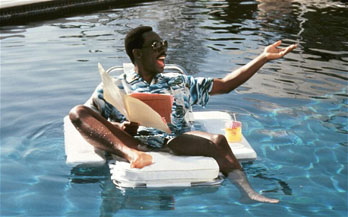Chapter Two: Beverly Hills Cop II
By Brett Ballard-Beach
August 30, 2012
Beverly Hills Cop II, by contrast, features Scott, who jokingly referred to himself once upon a time as a “director for hire” for Simpson/Bruckheimer, filling that role succinctly for them, or anyone, for the only time in his career. It is the only sequel in his oeuvre (Days of Thunder remaking the Top Gun template notwithstanding) but it is also the only one in which a single star performer holds court over the proceedings and the ensemble cast in support is given precious little to do or to with which to work. The script, based on a story for which star Eddie Murphy is given co-credit, is so lax in regards to every plot development in which Axel Foley is not involved, so uninterested in every character other than Foley (aside from allowing it to register that Taggart is on the outs with his wife and Rosewood has a serious gun fetish) that not even the villains, a disparate trio played by Jurgen Prochnow, Brigitte Nielsen, and Dean Stockwell are allowed to register as presences (let alone malevolent presences) that we have any opinions on, let alone want to see get their comeuppances.
The plot developments with regards to what the villains are doing and what they hope to achieve are fairly incomprehensible (bank robberies to serve as setup/diversion for a case of insurance fraud in order to raise money to then flee the country with cheaply bought munitions which will be sold on the black market in South America. . . I think), which leaves the majority of scenes to Murphy to do his shtick, play off against the uptight, the unwitting and the foolish. In most cases - a stuffy maître’d at a high-end strip club, receptionists at the Playboy Mansion and a shooting club - the interplay falls flat. The two exceptions are Gilbert Gottfried’s three-minute bit as a blithely corrupt accountant and Gil Hill, a real-life policeman, reprising his role as Foley’s infinitely exasperated superior, Inspector Todd, perhaps the finest performance in the realm of commanding officers chewing out their subordinates. In their own ways, Gottfried and Hill find a way to play along with and push back against Foley/Murphy and create dynamic and comic tension.
Lacking the first film’s fish out of water conceit and Martin Brest’s deftness at mixing broad comedy with unexpectedly jarring violence, Beverly Hills Cop II plays like what it is: a defining example of an unnecessary sequel, created by the “demand” of a predecessor that spent 14 weeks at #1 and seven months in the top 10, unexpectedly grossing over $230 million and receiving critical raves. Skipping even the expected cliché that this might start out in Beverly Hills and wind up back in Detroit, it settles time and again for the easy laugh, or barring that, winds up for the laugh and then stops at the setup (Paul Reiser’s character and some business involving the car he borrows from Foley and the outcome of Foley’s undercover sting against some credit card fraudsters are both built up and then futz out.
With no stake in his leading character, one who most definitely goes against the grain of all others in Scott’s subsequent films, there is a loss of an emotional touchstone, a way to infuse the comic and violent shenanigans with anything deeper. To tether this to a musical analogy with some relation to the film, his work here is the equivalent of Bob Seger and the Silver Bullet Band recording a glossy corporate rock number/theme song like “Shakedown” (which, by the by, became their only #1 Billboard Top 100 hit), which can be enjoyed but doesn’t satisfy like “Night Moves,” “Mainstreet” or “Turn the Page.”
The pre-credits and opening credits sequence illustrate this in miniature: a heist sequence in Beverly Hills filled with quick cuts and an overabundance of smashed glass and guns fired to the ceiling, followed by Foley back home “suiting up” in designer duds up for his undercover gig, a glaring example of how he (and the film) has subsumed the materialist mentality. Actually going back to Beverly Hills proves to be redundant. (As is a third title card which after the opening scenes in Beverly Hills and Detroit assures us that yes, we are back again in Beverly Hills, as if Captain Bogamil’s presence might be more confusing than helpful. I briefly mused that these would continue for the duration of the film).
Even the pile driving action sequences - a ridiculous chase sequence involving an armored truck and a cement mixer, the final shootout at ranch facilities adjacent to oil fields - don’t seem sufficiently larger than life, imbued with iconic forcefulness like shots of jets on runways in Top Gun or Peter Murphy in a cage deadpanning “Bela Lugosi’s Dead” into the camera. It is, if I may misuse the word, all a little too tasteful in Beverly Hills Cop II. And safe. While it may be overstating the point to say that Scott veered away from the likes of Beverly Hills Cop II, I think that once he had the freedom to choose only the scripts he wanted and settle on the projects that spoke to him, he was able to share that connection in the finished film. I am sad that he is gone.
Continued:
1
2
3
|
|
|
|




